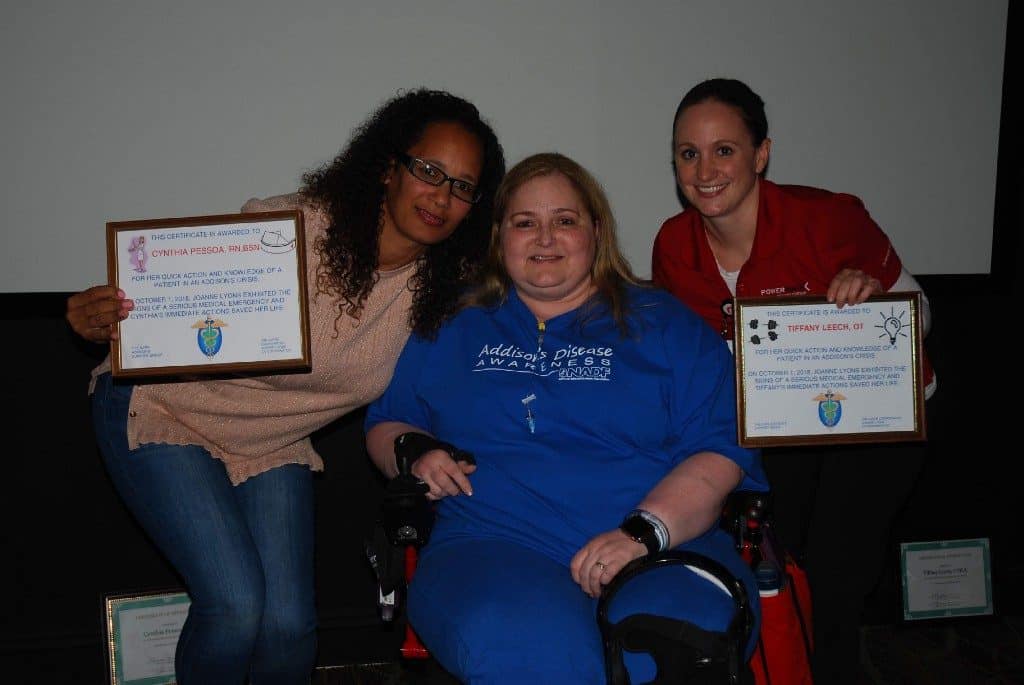
After saving Joanne Lyons’ life, two individuals received awards for their quick action. Now, Lyons hopes that more individuals in the healthcare field can be just as prepared

Although she has Addison’s Disease, a life-threatening disease that can take her life at any moment without warning, Joanne Lyons is often terrified of being taken to the hospital or riding in an ambulance.
That’s not because she’s afraid of the hospital. But instead, she fears for her life because, from her own experience, she’s been told by multiple nurses and doctors she is the first patient with Addison’s Disease they’ve ever treated.
“I dread going to the hospital or anything like that because it’s only as good as [those helping me] know,” said Lyons.
On Wednesday, Oct. 17, Lyons thanked two people she now shares a bond with after they saved her life earlier this month, thanks to their quick action and recognition that Lyons was going through an Adrenal Crisis, a situation for Addison’s patients that, if not treated fast enough and correctly, can be fatal.
Adrenal crisis can be brought on by illness or stress, such as an infection, severe pain and emotional stress. For example, Lyons attended her son’s wedding last year, and in preparation, she dosed steroids beforehand so as to prevent herself from going into adrenal crisis; she calls it a “stress dose.”
Earlier this month, Lyons was at Powerback Rehabilitation in Voorhees, rehabbing due to complications from Addison’s Disease. While in the rehab room, Lyons said she didn’t feel good while working with occupational therapist Tiffany Leech of Marlton.
Leech identified the characteristics of adrenal crisis for Lyons, who is in a power wheelchair. Leech took control of Lyons’ joystick, powering her out of the rehab room, into the elevator and up to Lyons room to get assistance from Cynthia Pessoa, Lyon’s nurse.
Pessoa was able to access Lyons’ Port A Cath, a central line to her heart. Pessoa dosed steroids, helping revive Lyons within 20 minutes.
“Because of the quick actions of these individuals I am alive today,” said Lyons. “I was in the right place at the right time.”
Both Leech and Pessoa received two awards on Oct. 17, one from the New Jersey/Pennsylvania Addison’s Support Group, where Lyons is co-coordinator and her friend Jan Judge is the coordinator. The group connects Addison’s Patients along the East Coast, discussing ways they treat their disease together.
Leech and Pessoa also received a certificate of appreciation for “outstanding clinical excellence and performance” from their supervisors at Powerback Rehabilitation.
Addison’s patients are steroid dependent for the rest of their lives after being diagnosed. It is the only treatment for the disease, and there is no cure. Long-time steroid use can cause brittle bones, organ problems and a plethora of additional health compilations due to a weakened immune system.
Addison’s Disease is life-threatening and affects approximately one in every 100,000 people, according to WebMD and Pituitary.org.
Lyons was an emergency medical technician before being diagnosed 22 years ago. Ironically, while an EMT for 12 years, Lyons had no knowledge of Addison’s Disease before being diagnosed.
Lyons says often those with Addison’s can be initially misdiagnosed due to doctors seeing symptoms as too similar as other diseases. Additionally, since being diagnosed, Lyons constantly runs into problems in hospitals or with EMTs and medics not immediately reacting to the needs of an Addison’s patient.
Lyons has a sticker on the back of her car stating she is adrenal insufficient and is steroid dependent. Her seatbelt is a medical alert, with information detailing what to do if she were to get into an accident and be unresponsive to law enforcement or emergency services arriving on scene. Lyons has these notifications around her life so as to make people aware, in fear that they don’t take an adrenal crisis seriously. Instead, she fears such a moment could be mistaken as being under the influence of drugs or alcohol, and she would not receive the help she needs in time.
Although she has been struggling with Addison’s Disease for 22 years and faced many hardships in treatment in moments of crisis occasionally from medics or health-care professionals, Lyons says she feels this moment was meant to happen in her life for a reason.
“If it’s my time to go, my goal is to help others and educate whoever wants to listen that this is real,” said Lyons. “I want to educate whoever will listen. My body is tired, and I’m just getting worse.”









